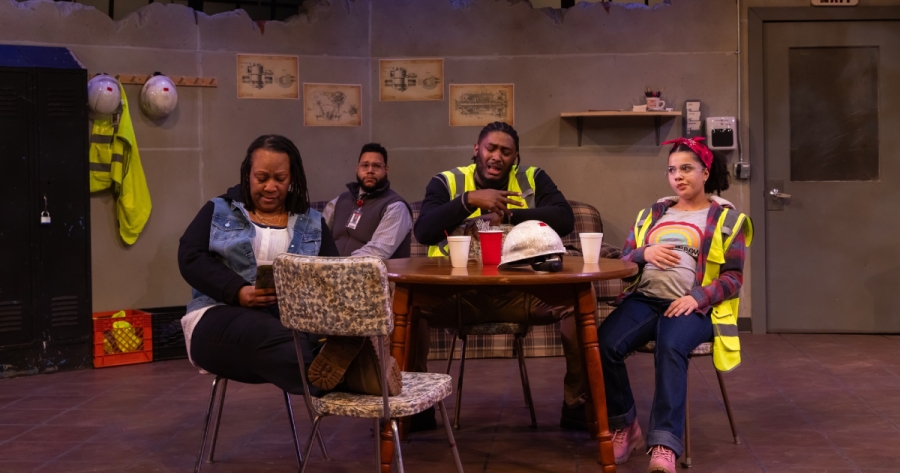The stories of Detroit are the stories of America. This is but one of many reasons that places Detroit native Dominique Morisseau’s brilliant “Skeleton Crew” solidly in the canon of classic American plays.
Farmers Alley Theatre in Kalamazoo has put up a stellar production of this remarkable 2014 play—the third in a trilogy that puts Detroit on stage much the way August Wilson put Pittsburgh at the center of his Century Cycle—that with four miraculously vivid characters and a single set in a brisk two hours tells a complex story of loyalties and survival in the last standing small auto factory amid the Great Recession of 2008.
The focus is on Faye, a “woman battling her own heat” who’s worked the line 29 years and is a proud union rep. Openly queer, she says “if it’s one thing I know it’s cars and women.” She pulls no punches with her anxious supervisor, Reggie, who has just recently turned white collar and whose mother was her soul mate, or her younger coworker, Dez, who dreams of opening his own auto shop, and Shanita, on whom he has a crush, and who’s pregnant, single, and works like her unborn child’s life depends on it.
All the tightly-written scenes play out in the factory’s break room, where the characters clock in and out, gossip, fret, trash talk, play cards, gamble, smoke, and eat together in repetitive motion, sensually, but like clockwork, like the movements of the line, like the day in and day out of the working class that they belong to. But what they say is more than the meaning of their words: it is sheer poetry. The rhythm of their speech mirrors the rhythm of their actions and of their work day. As Shanita notes, the sounds of the factory creates the music she craves. “It fills up the silence like it ain’t never gonna disappear on you or let you go,” she says ironically.
Though the play is not at all didactic, it plays out at the intersection of race, class, gender, and sexuality and honors the Black working class at a pivotal moment in history. Racism is a given rather than a subject, and how the characters manage to survive against the odds and choose their loyalties in a world in which there aren’t hard lines between family, management, and the union—and everyone’s needs are dire—make for incredibly high stakes.
Especially given how easily we fall in love with these characters who are made incredibly real thanks to truly fine performances under excellent direction from Dee Dee Batteast. Dwandra Nickole Lampkin is a natural, fully embodied Faye—so much so it’s as if she’s not acting at all, with every emotion, ever fear, and every attempt to hide each moral dilemma deftly written all over her face. Her scenes with Dan Johnson as Reggie go especially deep, and he exudes anxiousness as well as the turmoil of balancing orders from the top with taking care of people who are his. Jessica Krolik is a sweet, poised Shanita, who deftly reveals that which roils beneath the surface; and Xavier D. Bolden brings tremendous energy and wonderful complexity to Dez who grapples with the violent cultural demands of masculinity right before our eyes.
And there is no greater character on stage than the one collaboratively created by the playwright, all of the actors, as well as the technical staff with choices subtle and grand: Detroit itself. The city is summoned in speech patterns, in names of streets and neighborhoods, in the generational and personal stories, in the atmosphere of the factory break room through Sam Snow’s set, Savannah Draper’s props, Nicole Peckens’ costumes, Jason Frink’s lights, and Carter Furland’s sound; as well as further aurally, through wonderful original music by James Keys as well as visually, with literal images of auto parts on the line and panoramic shots of abandoned factories and empty lots throughout the city in projected images by David Clemens.
“Skeleton Crew” shows us a crucial and painful piece of Michigan’s recent history that speaks, in part, to why we’re in our current cultural crisis. But it does so with extraordinary skill, care, and beauty. Morisseau’s play is one for the ages, and to have the opportunity to see it produced so artfully, and in the state of its origin, is a real gift.
Skeleton Crew
Farmers Alley Theatre
March 7-17
farmersalleytheatre.com
Photo Courtesy of Becky Klose / Klose2U Photography.





